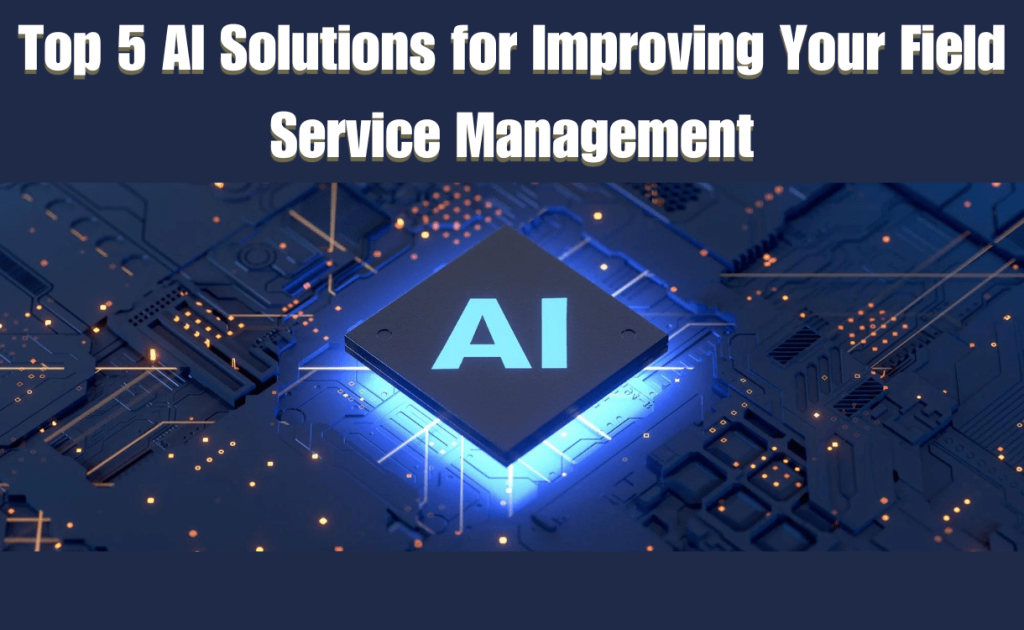- Streamlining Field Operations with AI
- AI-Powered Scheduling and Routing
- Predictive Maintenance and Asset Management
- Enhanced Customer Experience
- Inventory Management and Stock Optimization
- Data Analytics for Continuous Improvement
- Choosing the Right AI Solution
- Implementation Challenges and Solutions
- Measuring ROI and Performance
- Future Trends in AI for FSM
- Challenges and Ethical Considerations
In today’s fast-paced business landscape, efficient Field Service Management (FSM) is crucial for delivering top-notch customer service and maintaining a competitive edge. Traditionally, FSM relied heavily on manual processes, but with the advent of Artificial Intelligence (AI), the game has changed. AI offers innovative solutions that can revolutionize how your field operations are managed. In this article, we’ll explore the top five AI-powered solutions that can significantly enhance your FSM practices.
Table of Contents
Streamlining Field Operations with AI
How AI can optimize field service operations
AI, with its advanced algorithms and machine learning capabilities, can analyze vast amounts of data to make informed decisions in real-time. This means smarter scheduling, improved resource allocation, and reduced operational costs.
Examples of industries benefiting from AI in FSM
Industries such as telecommunications, healthcare, and manufacturing are already reaping the benefits of AI-driven FSM. They experience increased efficiency, faster response times, and happier customers.
AI-Powered Scheduling and Routing
Benefits of AI-driven scheduling
One of the key challenges in FSM is efficient scheduling and routing. AI can dynamically optimize schedules based on factors like traffic, technician availability, and urgency, ensuring that your field workforce is always in the right place at the right time.
Real-time route optimization
With AI, route changes can be made in real time, accounting for unexpected delays or urgent service requests. This agility minimizes downtime and maximizes productivity.
Predictive Maintenance and Asset Management
Preventive vs. predictive maintenance
Traditional preventive maintenance relies on fixed schedules, often leading to unnecessary servicing. AI introduces predictive maintenance, which analyzes equipment data to predict failures before they happen, reducing downtime and saving costs.
AI’s role in predicting equipment failures
Through continuous monitoring and data analysis, AI can identify patterns indicative of impending equipment failures, prompting timely maintenance interventions and preventing costly breakdowns.
Read more
Best Apps Powered by GPT-4
Enhanced Customer Experience
Personalization through AI
AI can help personalize customer interactions by analyzing historical data and preferences. Technicians can arrive with relevant information and recommendations, enhancing the overall customer experience.
Quick issue resolution with AI chatbots
AI-powered chatbots can provide immediate assistance and basic troubleshooting, reducing the need for on-site visits and improving customer satisfaction.
Inventory Management and Stock Optimization
Inventory challenges in FSM
Balancing inventory levels in FSM can be challenging. AI-powered demand forecasting can help optimize stock levels, ensuring you have the right parts when you need them, while minimizing excess inventory costs.
AI’s role in demand forecasting
AI algorithms analyze historical data and real-time usage patterns to accurately predict inventory needs, reducing carrying costs and stockouts.
Data Analytics for Continuous Improvement
Collecting and analyzing FSM data
Data is the lifeblood of AI in FSM. Collecting and analyzing data from field operations can provide insights into areas for improvement, helping businesses make data-driven decisions.
AI-driven insights for decision-making
AI can uncover hidden trends and correlations in FSM data, allowing organizations to make proactive decisions and fine-tune their operations for better efficiency.
Choosing the Right AI Solution
Factors to consider when selecting AI for FSM
Selecting the right AI solution for your FSM needs involves assessing factors like scalability, integration capabilities, and customization options. One size does not fit all, so choose wisely.
Customization and scalability
AI solutions should align with your unique requirements and be scalable to accommodate future growth.
Read more
How to Start a Successful Online Business
Implementation Challenges and Solutions
Overcoming resistance to AI adoption
Resistance to change is common. Effective change management strategies, along with training and clear communication, can help overcome resistance and ensure a smooth transition.
Training and change management
Proper training ensures that your team can harness the full potential of AI tools. Change management strategies ease the transition, making adoption more successful.
Measuring ROI and Performance
Key performance indicators (KPIs)
Establish clear KPIs to measure the impact of AI on your FSM operations. This provides tangible metrics to evaluate your ROI.
Tracking AI’s impact on FSM
Through ongoing monitoring and evaluation, you can track AI’s performance and make necessary adjustments to maximize benefits.
Future Trends in AI for FSM
Emerging technologies in FSM
Stay ahead of the curve by exploring emerging technologies such as the Internet of Things (IoT) and 5G, which can further enhance AI capabilities in FSM.
The role of IoT and 5G
IoT devices and 5G networks enable real-time data exchange and remote monitoring, opening up new possibilities for FSM.
Challenges and Ethical Considerations
Data privacy and security
As you embrace AI in FSM, ensure robust data privacy and security measures to protect sensitive customer and operational data.
Ensuring fairness and transparency
AI algorithms must be fair and transparent to avoid bias and maintain trust in your FSM processes.
Ethical use of AI in FSM
Strive for ethical AI practices, respecting customer privacy and adhering to legal and regulatory standards.
Conclusion
In conclusion, AI solutions are transforming the landscape of Field Service Management, offering unparalleled benefits to businesses across various industries. By streamlining field operations, optimizing scheduling, enabling predictive maintenance, enhancing the customer experience, and revolutionizing inventory management, AI is becoming an indispensable tool for field service organizations.
Selecting the right AI solution requires careful consideration of customization, scalability, and integration capabilities. Overcoming implementation challenges through effective training and change management is crucial for success. Measuring ROI and performance through well-defined KPIs ensures that your investment in AI delivers the expected results.
Looking ahead, emerging technologies like IoT and 5G promise to take AI in FSM to new heights, enabling real-time data exchange and remote monitoring. However, organizations must also address ethical considerations and data privacy to maintain trust and compliance in this AI-driven era.
Incorporating AI into your FSM strategy can lead to improved efficiency, reduced costs, and a competitive edge in the market. Embrace the power of AI and position your field service operations for a future of innovation and success.
This is the final part of this article. I have shared all queries about the Top 5 AI Solutions for Improving Your Field Service Management. Hope you will understand all about it. If you have any queries regarding this please comment through the box. Don’t forget to share it with your friends & family.
Please click here to see the new post. Thank you!!!
FAQs
What are the primary benefits of using AI in field service management?
AI in field service management offers benefits such as improved operational efficiency, optimized scheduling, reduced maintenance costs, enhanced customer experiences, and data-driven decision-making.
How can AI improve customer experiences in field service?
AI can enhance customer experiences by personalizing interactions, providing quick issue resolution through chatbots, and ensuring that technicians arrive with relevant information and recommendations.
Are there any risks associated with AI adoption in field service management?
Yes, risks include data privacy and security concerns, potential bias in AI algorithms, and the need for ethical AI practices. However, these risks can be mitigated with proper safeguards and adherence to ethical standards.
What industries can benefit the most from AI in field service management?
Industries such as telecommunications, healthcare, manufacturing, and utilities can benefit significantly from AI in field service management due to the complex and dynamic nature of their operations.
How can businesses start implementing AI solutions in their field service operations?
To begin implementing AI solutions in field service operations, businesses should assess their specific needs, choose the right AI tools, provide training to employees, and ensure effective change management strategies to facilitate adoption and maximize benefits.





